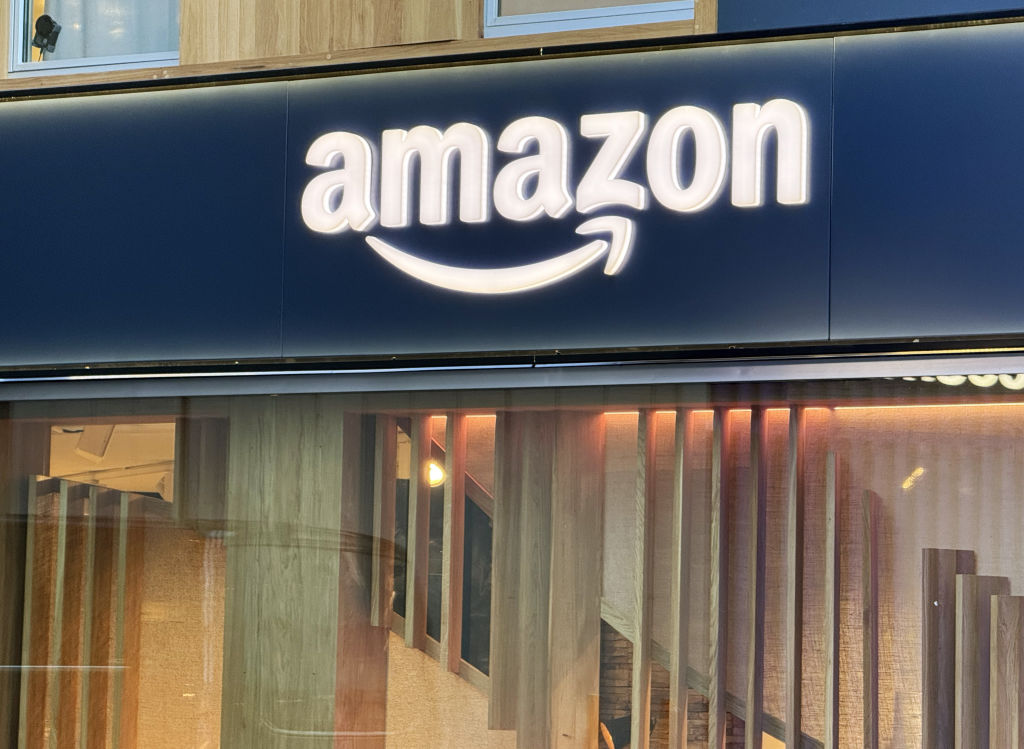How Amazon Stock Became a Member of the 100,000% Return Club
Amazon's wide moat is one reason it has generated a 100,000%-plus return for investors over the long haul.


Profit and prosper with the best of Kiplinger's advice on investing, taxes, retirement, personal finance and much more. Delivered daily. Enter your email in the box and click Sign Me Up.
You are now subscribed
Your newsletter sign-up was successful
Want to add more newsletters?

Delivered daily
Kiplinger Today
Profit and prosper with the best of Kiplinger's advice on investing, taxes, retirement, personal finance and much more delivered daily. Smart money moves start here.

Sent five days a week
Kiplinger A Step Ahead
Get practical help to make better financial decisions in your everyday life, from spending to savings on top deals.

Delivered daily
Kiplinger Closing Bell
Get today's biggest financial and investing headlines delivered to your inbox every day the U.S. stock market is open.

Sent twice a week
Kiplinger Adviser Intel
Financial pros across the country share best practices and fresh tactics to preserve and grow your wealth.

Delivered weekly
Kiplinger Tax Tips
Trim your federal and state tax bills with practical tax-planning and tax-cutting strategies.

Sent twice a week
Kiplinger Retirement Tips
Your twice-a-week guide to planning and enjoying a financially secure and richly rewarding retirement

Sent bimonthly.
Kiplinger Adviser Angle
Insights for advisers, wealth managers and other financial professionals.

Sent twice a week
Kiplinger Investing Weekly
Your twice-a-week roundup of promising stocks, funds, companies and industries you should consider, ones you should avoid, and why.

Sent weekly for six weeks
Kiplinger Invest for Retirement
Your step-by-step six-part series on how to invest for retirement, from devising a successful strategy to exactly which investments to choose.
Editor's note: This is part two of a 13-part series about companies whose shares have amassed 100,000% returns for investors and the path taken to generate such impressive gains over the long term. Part one is: McDonald's Stock: How Small Changes Have Led to 100,000% Returns.
Amazon.com (AMZN) is yet another story about a company that was launched out of the founder's garage and, originally, focused on books alone. While technology was advancing at the time, it hit an inflection point in the mid-1990s. So-called "applications" evolved into "platforms" that could support many processes at one time whether they were similar or disparate. By 1998, Amazon's application for selling books became a platform for selling everything, and today that's exactly what Amazon does.
But the story of Amazon also shows the perils of investing in technology companies. It's possible there are few investors who reaped the full 180,000% return because of the paper losses they would have had to endure during the company's formative years. Indeed, near the end of 1999, Amazon stock was trading at a split-adjusted $4.25. By March of 2001, shares were priced at $0.51, a stunning loss of 82% of its value. This likely cleared out most of the early investors.
From just $107.88 $24.99 for Kiplinger Personal Finance
Become a smarter, better informed investor. Subscribe from just $107.88 $24.99, plus get up to 4 Special Issues

Sign up for Kiplinger’s Free Newsletters
Profit and prosper with the best of expert advice on investing, taxes, retirement, personal finance and more - straight to your e-mail.
Profit and prosper with the best of expert advice - straight to your e-mail.
New investors who thought $0.51 was a buy didn't fare much better. From the $0.51 price in March of 2001, the shares bottomed out at $0.30 in September. These new investors lost 42% of their money in just six months. For the investors who got in at $4.25, the apparent bottom at $0.51 was just a weigh station.
Little of this pain is remembered. Nor is it rare. Apple and Nvidia delivered wild rides too. There are some lessons that can be drawn from Amazon, however. First, earning a mega return may depend on diversification. Most investors would flee a 92% loss. Those who didn't may have stayed in because Amazon shares represented a small position in their overall portfolio, and the loss simply did not matter that much. In some cases, it may have come down to luck. Imagine the happy surprise for investors who held Amazon stock in a long-forgotten account, and discovered their shares 20 years later.
The other lesson is that technology investing will almost always be volatile. One reason is that, in many cases, other competitors can adopt similar technologies and compete head-on. In 2000, there were lots of online retailers. But Amazon pulled ahead because it built a moat that was hard for other companies to compete with.
Amazon's first moat was a large network of captured users through its Amazon Prime memberships. Today there are 180 million Amazon Prime members, whose business can be counted on, and who can be stimulated to buy more from Amazon. Amazon's second moat is being built today, right now. Amazon Web Services, or AWS, is the company's powerhouse. It accounted for just 16% of revenues in 2023, but 67% of operating income. For Amazon, growth in retailing will always be important, but for growth in earnings, web services may prove to be the ultimate driver.
By the way, Amazon feels like a monopoly, but it isn't. Total retail sales in the United States are about $7 trillion. For 2023, Amazon's total sales were about $575 billion, or about 8.2% of all retail sales. While Amazon has less than 10% of retail sales, it's an amazing number for a company that's just 30 years old. It took Sears, founded in 1892, almost 70 years to reach its zenith in the 1960s. In the smaller subset of e-commerce, Amazon has about 38% of all sales, a much larger number.
For companies with a 38% share of the market, investors worry whether they can hold onto it. In the case of Amazon, the question might more accurately be, how much more of the market will they take that they don't already have?
Note: This content first appeared in Louis Navellier's latest book, The Sacred Truths of Investing: Finding Growth Stocks that Will Make You Rich, which was published by John Wiley & Sons, Inc.
Related content
Profit and prosper with the best of Kiplinger's advice on investing, taxes, retirement, personal finance and much more. Delivered daily. Enter your email in the box and click Sign Me Up.

-
 Quiz: Do You Know How to Avoid the "Medigap Trap?"
Quiz: Do You Know How to Avoid the "Medigap Trap?"Quiz Test your basic knowledge of the "Medigap Trap" in our quick quiz.
-
 5 Top Tax-Efficient Mutual Funds for Smarter Investing
5 Top Tax-Efficient Mutual Funds for Smarter InvestingMutual funds are many things, but "tax-friendly" usually isn't one of them. These are the exceptions.
-
 AI Sparks Existential Crisis for Software Stocks
AI Sparks Existential Crisis for Software StocksThe Kiplinger Letter Fears that SaaS subscription software could be rendered obsolete by artificial intelligence make investors jittery.
-
 5 Top Tax-Efficient Mutual Funds for Smarter Investing
5 Top Tax-Efficient Mutual Funds for Smarter InvestingMutual funds are many things, but "tax-friendly" usually isn't one of them. These are the exceptions.
-
 Why Invest In Mutual Funds When ETFs Exist?
Why Invest In Mutual Funds When ETFs Exist?Exchange-traded funds are cheaper, more tax-efficient and more flexible. But don't put mutual funds out to pasture quite yet.
-
 Social Security Break-Even Math Is Helpful, But Don't Let It Dictate When You'll File
Social Security Break-Even Math Is Helpful, But Don't Let It Dictate When You'll FileYour Social Security break-even age tells you how long you'd need to live for delaying to pay off, but shouldn't be the sole basis for deciding when to claim.
-
 I'm an Opportunity Zone Pro: This Is How to Deliver Roth-Like Tax-Free Growth (Without Contribution Limits)
I'm an Opportunity Zone Pro: This Is How to Deliver Roth-Like Tax-Free Growth (Without Contribution Limits)Investors who combine Roth IRAs, the gold standard of tax-free savings, with qualified opportunity funds could enjoy decades of tax-free growth.
-
 One of the Most Powerful Wealth-Building Moves a Woman Can Make: A Midcareer Pivot
One of the Most Powerful Wealth-Building Moves a Woman Can Make: A Midcareer PivotIf it feels like you can't sustain what you're doing for the next 20 years, it's time for an honest look at what's draining you and what energizes you.
-
 Stocks Make More Big Up and Down Moves: Stock Market Today
Stocks Make More Big Up and Down Moves: Stock Market TodayThe impact of revolutionary technology has replaced world-changing trade policy as the major variable for markets, with mixed results for sectors and stocks.
-
 I'm a Wealth Adviser Obsessed With Mahjong: Here Are 8 Ways It Can Teach Us How to Manage Our Money
I'm a Wealth Adviser Obsessed With Mahjong: Here Are 8 Ways It Can Teach Us How to Manage Our MoneyThis increasingly popular Chinese game can teach us not only how to help manage our money but also how important it is to connect with other people.
-
 Looking for a Financial Book That Won't Put Your Young Adult to Sleep? This One Makes 'Cents'
Looking for a Financial Book That Won't Put Your Young Adult to Sleep? This One Makes 'Cents'"Wealth Your Way" by Cosmo DeStefano offers a highly accessible guide for young adults and their parents on building wealth through simple, consistent habits.